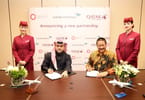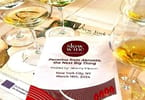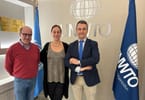September 27 is also the start of the Jewish New Year, 5783. After what seemed like a never-ending pandemic, the travel and tourism industry needs to take a pause, to contemplate these last few years, and go beyond the recent past with our sights set on a better future. This is a time not to complain but to contemplate the industry’s challenges and needs, and to celebrate the fact that despite everything, travel and tourism are still alive.
Unfortunately travel and tourism must survive not only despite the Covid-19 multiple pandemics but also despite violence in the world, inflation that is tearing both corporate and personal budgets apart, crime waves through much of the world, supply chain issues, and a lack of skilled employees. All these problems mean that it is not easy to maintain a njem na-adigide ngwaahịa.
To help you develop sustainable tourism in a period of strife, consider some of the following suggestions.
-Up the level of your service and make it fun. Travel for many people simply is not fun anymore. Long airport lines, the need to remove articles of clothing, the tearing apart of briefcases and suitcases, delayed planes, and no food makes travel (especially air travel) much more of a hassle than a pleasure. Help your guests to recover through extra thoughtful service. Encourage hotels to develop “stress-down” meals, to provide extras from a smile to special bathroom sundries. Encourage attractions to have special “thanks for traveling days.” In other words, do everything possible to put the fun back in travel.
-Think about what makes your customers dissatisfied. When things go wrong are your employees empowered to offer upgrades, do you ask visitors in which areas you can improve, do you test out new ideas, and do you hear customer requests? The hospitality industry is based on the notion that its professionals desire to serve others.
-Make it easy for people to be good to your customers. Prioritize the type of person who is best for your travel business. Ask yourself if you are seeking creativity or for a replica of yourself? Rank qualities such as intelligence, creativity, experience, enthusiasm, innovativeness, and experience. Each of these qualities has both an up side and a down side. For example, intelligent employees are great on-the-spot decision makers but less good at following orders.
-Ask for input from employees and from your customers and reward both. Nothing seems to bother people more than when you pick their brains for new ideas and fail to reward the creator. Honor people with small gifts, certificates, or letters in their file.
-Pay your security people top dollar. In the twentieth century, security was seen as an add-on, the bonus or a required extra. In the twenty-first century, people want to see security guards and they want to know that they are professionals. This professionalization of the profession comes about through good training, good wages, and strict standards. In a like manner, police officers today should be paid well and expected to perform at the highest levels. No community can afford to skimp on its police department and communities which are tourism dependent and should begin to develop a “Tourism Oriented Policing Services (TOPS)” unit.
-Make sure that your visitor personnel have fun at what they do. Good service in tough times comes when visitor professionals have fun at their job. While everyone who works in the travel and visitor industry is a target, too much thinking about what might go wrong will only play into the hands of terrorists. Do things to make sure that people who work in the travel and visitor industry have fun at work. These extras will soon translate into smiles that will help your employees to transform the frustration of travel into the fun of meeting new people.
-Do regular tourism security assessments, and in this post-Covid world, include biosecurity issues as part of your assessment. You should know what is vulnerable in your community and what may be unsafe. Good assessments look at everything from airport safety to who has access to a guest’s room. Such an assessment should look not only at issues of terrorism but also at issues of crime, and how these crimes can be prevented. Ask yourself what your community is doing to protect tourists from crimes of distraction, fraud, and identity theft. Do not forget that a tourism service provider who does not provide the service for which s/he has contracted is also dishonest.
-Do not only focus only on terrorism, but also do not ignore it. Terrorism today is a hot topic, but there is a higher probability that visitors will be touched by an act of crime than by an act of terrorism. Know which are the crimes that are most likely to impact visitors to your community. Then develop a plan that coordinates security professionals, law enforcement, the political establishment, and the tourism industry. Remember that a poorly trained police force can almost overnight destroy a well thought out marketing program.
-Fix rather than market. All too often the tourism industry puts its major dollars into marketing strategies. Good marketing can attract visitors, but it cannot hold visitors. If visitors are mistreated, robbed, or must deal with a police department that is bureaucratic or unsympathetic, visitors are not only unlikely to return to your community, but there is a great chance that they will engage in negative marketing.
-Have multiple and flexible recovery plans. It is impossible to tell when a tragedy may strike. The most that can be expected is that you practice good risk management. Also make sure that your community is prepared to face the media, that you have a compensation package ready for your guests, and that you have developed a “visitor caring center” to aid people who are away from home and need your aid.
Onye ode akwụkwọ, Dr. Peter E. Tarlow, bụ Onye isi ala na Onye-nhazi nke World Tourism Network na -eduga ndị Njem nlegharị anya dị mma omume.
IHE Ị GA-Ewepụ na edemede a:
- After what seemed like a never-ending pandemic, the travel and tourism industry needs to take a pause, to contemplate these last few years, and go beyond the recent past with our sights set on a better future.
- Unfortunately travel and tourism must survive not only despite the Covid-19 multiple pandemics but also despite violence in the world, inflation that is tearing both corporate and personal budgets apart, crime waves through much of the world, supply chain issues, and a lack of skilled employees.
- This is a time not to complain but to contemplate the industry's challenges and needs, and to celebrate the fact that despite everything, travel and tourism are still alive.























